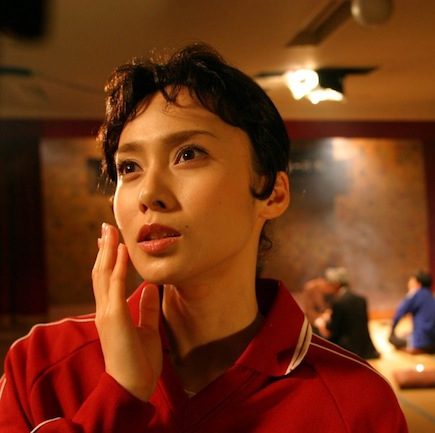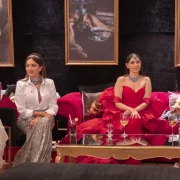Literature and cinema more often go hand in hand. The art of adapting a beloved book into a compelling film is a tightrope walk that few filmmakers can actually pull off. But beyond some fan-favourite (and despised) adaptations that we already know — fiction and non-fiction books alike have inspired hundreds of our favourite films. From timeless classics like ‘Pride and Prejudice’ to contemporary gems like ‘All The Bright Places’ these adaptations have left an indelible mark on the cinematic landscape, breathing life into characters and narratives that have captured our hearts and minds. Here are 25 of our favourite book-to-film adaptations, in no particular order.
The Colour Purple (1985)
Based on the Pulitzer Prize-winning 1982 novel by Alice Walker, this was Steven Spielberg’s eighth film as a director and marked a turning point in his career. The film tells the story of a young African-American girl named Celie Harris and shows the problems African-American women experienced during the early 20th century, including domestic violence, incest, paedophilia, poverty, racism, and sexism.
Kaccha Limbu (2017)
Marathi cinema has consistently ventured into unconventional territories, addressing bold and significant yet often uncomfortable topics. Prasad Oak’s “Kachcha Limbu” is no exception. Based on the contemporary writer Jaywant Dalvi’s novel, ‘Runanubandha’, the film revolves around the life of Mohan and Shaila Katdare, a couple dealing with the challenges of raising their special child, Bachchu, as he enters puberty, and hormones bring unforeseen complexities into their lives.
Little Women (2019)
Greta Gerwig’s films are all the rage these days, all thanks to ‘Barbie’. But the director has had more hits throughout her career than misses – and ‘Little Women’ is one of them. The coming-of-age period drama film is the seventh film adaptation of the 1868 novel by Louisa May Alcott. It chronicles the lives of the March sisters—Meg, Jo, Beth, and Amy—in Concord, Massachusetts, during the 19th century.
What’s Love Got to Do With It (1993)
This classic portrays the life of an icon – American singer-songwriter Tina Turner. Based on Tina’s 1986 autobiography ‘I, Tina’, the film stars Angela Bassett as Tina and Laurence Fishburne as her abusive husband Ike Turner. It highlighted the struggles Turner faced and how she gained the courage to break free from them.
Pride and Prejudice (2005)
It is difficult to overstate the impact that Jane Austen’s Pride and Prejudice has had on literature and culture since its publication in 1813. Out of the thousands of adaptations of her book we have seen and loved for decades, the 2005 classic stands out. It’s one of the few classic romantic films that hasn’t aged badly, and, like the novel it’s based on, remains timeless. Beyond that, it really just feels like a warm hug in the middle of heavy rain.
Crouching Tiger, Hidden Dragon (2000)
Ang Lee’s Crouching Tiger, Hidden Dragon is an adaptation of a Chinese novel by Wang Dulu. The cast consisted of Michelle Yeoh, Chow Yun-fat, Zhang Ziyi, and Chang Chen — all big names in Asian entertainment and Hollywood. Set in 1800s China, a swordsman and his friend discover that a thief has stolen their legendary sword and set out on the adventure of their lives to retrieve it.
How Stella Got Her Groove Back (1998)
This film is a 1998 American romantic comedy-drama film directed by Kevin Rodney Sullivan, adapted from Terry McMillan’s best-selling 1996 novel of the same title. The book was inspired by the author’s real-life romance with a Jamaican 20 years her junior. The film touched on themes of self-discovery, love, and the societal pressures women face regarding age and relationships.
The Princess Diaries (2001)
Based on a series of epistolary young adult novels written by Meg Cabot, the film follows Mia Thermopolis, a shy American teenager who learns she is heir to the throne of a European kingdom. Under the guidance of her estranged grandmother, the kingdom’s reigning queen, Mia must decide whether to claim the throne she has inherited or renounce her title permanently.
The Maze Runner (2014)
One of the more underrated franchises in the genre of young adult dystopian science fiction – ‘Maze Runner’ is a post-apocalyptic story set in the time of what they call, ‘Sun Flares,’ a phenomenon that caused a massive outbreak of the so-called, ‘Flare virus’. Based on a novel by James Dashner – both the book and the trilogy of films continue to be one of the most interesting stories that came out of the YA dystopia film craze.
Goodfellas (1990)
Martin Scorsese’s Goodfellas features an all-star cast and delves into the world of masculinity. The film follows the life of Henry Hill, J.R. a real-life gangster, and how he became embroiled in the mafia in the early 1950s. A film adaptation of the 1985 nonfiction book Wiseguy by Nicholas Pileggi – who also wrote the film – It’s an incredibly immersive film because you can’t help but be swept along in this epic journey of crime, drugs, friendship, violence and betrayal.
Drive My Car (2021)
Adapted from Haruki Murakami’s short story, Ryusuke Hamaguchi’s Drive My Car follows a widowed actor who hires a twenty-year-old woman to be his chauffeur. Nominated for Best Picture, Best Director, Best International Feature Film, and Best Adapted Screenplay at the 94th Academy Awards, the film is a critically acclaimed Japanese melodrama.
Omkara (2006)
An adaptation of Shakespeare’s ‘Othello’ set in India, this Vishal Bhardwaj film is a story of betrayal, revenge, love, prejudice and much more. Although the film wasn’t received well by audiences back when it first graced the silver screen, it has gained a cult following since – with many dubbing it as Bhardwaj’s ‘Magnum Opus’ and one of the finest films in Hindi Cinema.
Parineeta (2005)
Pradeep Sarkar’s Parineeta is the story of two neighbours Shekhar and Lolita, who share love, lust and companionship, but don’t realize any of it, till destiny attempts to part them. Based on a 1914 Bengali-language novel by Sarat Chandra Chattopadhyay, it explores the experience of being a woman in the time period and the social dynamics in the context of religion and class through love, marriage and family.
A Walk to Remember (2002)
Nicholas Sparks is arguably one of the ‘Kings’ of early-2000s romance, and while ‘The Notebook’ gets most of the love from fans, ‘A Walk to Remember’ is yet another film that deserves more attention. Set in North Carolina, A Walk To Remember follows the rite of passage of a jaded, aimless high school senior who falls in love with a guileless young woman he and his friends once scorned.
All The Bright Places (2020)
Based on the heart-breaking book by Jennifer Niven, All the Bright Places takes place in modern-day Indiana and follows two teenagers named Violet and Finch. Both the film and the book address important topics such as mental health, depression and suicide for a younger audience. All the Bright Places asserts that teen romcoms, while fun and distracting, aren’t the only movies that matter to young audiences.
Carol (2015)
Based on the 1952 romance novel by Patricia Highsmith, ‘The Price of Salt’ – Carol was something of an immediate landmark in the cinematic landscape. The film beautifully conveys the complex and heartbreaking realities of relationships through the forbidden affair between aspiring photographer Therese and the elegant Carol, in 1950s New York.
Battle Royale (2000)
Based on the eponymous novel by Koushun Takami released a year prior, itself loosely inspired by Richard Connell’s The Most Dangerous Game, Battle Royale is a controversial yet notable piece of film history. Set in fictional, dystopian Japan, a class of ninth graders are given three days to fight to their death until only one is left standing. The movie is violent and though controversial – many hail the film as the “best teen movie in modern cinema”.
The Princess Bride (1987)
William Goldman’s adaptation of his own 1973 novel, The Princess Bride, was one of the most memorable fantasy romance movies of the 1980s. With a star-studded cast fully equipped with unforgettable one-liners, people still quote the many moments of this movie 36 years after its debut. Through his fairy tale, The Princess Bride, Goldman ridicules numerous tropes of fairy tales and simultaneously critiques overdone expositions.
Memories of Matsuko (2006)
While combing through the belongings of his recently deceased aunt, Matsuko, her nephew Sho pieces together the crucial events that sank her life into a sea of bitterness. The Japanese tragicomedy musical film by Tetsuya Nakashima is based on a Japanese novel by Muneki Yamada. Many often compare the film to another classic, Amelie, due to the similarity in both of its eponymous characters and its magical realism – but the film is a classic in its own right.
The Shining (1980)
Often dubbed as the “greatest horror movie of all time”, the Stanley Kubrick film is one of the first that comes to mind when you think of the genre. It’s a creepy, unnerving, deeply engaging cinematic adaptation of Stephen King’s beloved novel. The film follows a family as they move to an isolated hotel for the winter where a sinister presence influences the father into violence, while his psychic son sees horrific forebodings from both past and future.
Jurassic Park (1993)
Very few films have transcended generations of movie-goers quite like the first Jurassic Park film. The iconic Steven Spielberg adaptation of the Michael Crichton novel landed in theatres 30 years ago and heralded a new era of computer-generated movie effects. Though the science of the film has been widely criticised since its release, Jurassic Park succeeded in revolutionising film-making and reigniting a public fascination with dinosaurs even as palaeontology itself underwent a boom in new research efforts.
The Godfather (1972)
Set in 1940s New York, entirely within the world of the Corleones, a fictional Mafia family – The Godfather is a cult classic that arguably needs no introduction. The trilogy of crime films directed by Francis Ford Coppola was inspired by the 1969 novel of the same name by Italian-American author Mario Puzo – and despite more than 50 years after its release, the film remains a cultural touchstone continuing to captivate audiences and critics alike.
The Devil Wears Prada (2006)
Andy, a recent college graduate lands herself a job at the prestigious Runway magazine as the assistant to diabolical, ruthless and cynical editor Miranda Priestly. Beyond being one of the most fashionable films of the decade, serving as an inspiration to fashion enthusiasts even today, the overarching theme of the film – based on the 2003 novel by Lauren Weisberger explores a range of sociological issues from class, gender, and identity to power.
Don`t Look Now (1973)
Based on Daphne du Maurier’s short story, Don’t Look Now opens with the death of a child, but the tragedy is that of her parents, John and Laura Baxter. This haunting thriller and study of the psychology of grief is one of the most accomplished and troubling films by the British director Nicolas Roeg – and remains one of the seminal film works of both the 1970s and the horror genre as a whole.
The First Wives Club (1996)
We love everything about this movie: the acting, the humour, and the friendship of three reunited friends. The film follows three first wives, played by Bette Midler, Goldie Hawn, and Diane Keaton, who decide to get revenge on their ex-husbands after the death of a close friend. Based on the 1992 best seller by Olivia Goldsmith, the film is a vintage screwball comedy with strong feminist themes – well ahead of its time.





